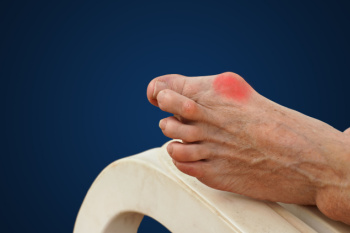
A bunion is a bony bump at the base of the big toe, causing it to lean toward the second toe. This deformity, consisting of bone and soft tissue, can result in significant discomfort. Bunions often develop from wearing tight or narrow shoes, particularly among women. Heredity also may play a part in bunion development. When lifestyle changes like wearing wider shoes and using protective pads do not alleviate the pain, bunion removal surgery, or a bunionectomy, may be necessary. This outpatient procedure can involve osteotomy to realign the toe or exostectomy to remove the bunion. Post-surgery, recovery typically takes six to eight weeks, with full recovery in four to six months. Patients initially wear a surgical boot or cast, and gradually transition to weight-bearing activities. Long-term success after bunion surgery hinges on proper footwear choices to prevent recurrence. If you are experiencing toe pain from a bunion, it is suggested that you schedule an appointment with a podiatrist for an exam, diagnosis, and treatment options.
If you are suffering from bunion pain, contact one of our podiatrists of Pennsylvania Foot & Ankle. Our doctors can provide the care you need to keep you pain-free and on your feet.
What Is a Bunion?
Bunions are painful bony bumps that usually develop on the inside of the foot at the joint of the big toe. As the deformity increases over time, it may become painful to walk and wear shoes. Women are more likely to exacerbate existing bunions since they often wear tight, narrow shoes that shift their toes together. Bunion pain can be relieved by wearing wider shoes with enough room for the toes.
Causes
- Genetics – some people inherit feet that are more prone to bunion development
- Inflammatory Conditions - rheumatoid arthritis and polio may cause bunion development
Symptoms
- Redness and inflammation
- Pain and tenderness
- Callus or corns on the bump
- Restricted motion in the big toe
In order to diagnose your bunion, your podiatrist may ask about your medical history, symptoms, and general health. Your doctor might also order an x-ray to take a closer look at your feet. Nonsurgical treatment options include orthotics, padding, icing, changes in footwear, and medication. If nonsurgical treatments don’t alleviate your bunion pain, surgery may be necessary.
If you have any questions, please feel free to contact one of our offices located in Bensalem, Pennsylvania, Port Richmond, Philadelphia, and Hamilton, New Jersey . We offer the newest diagnostic and treatment technologies for all your foot care needs.
